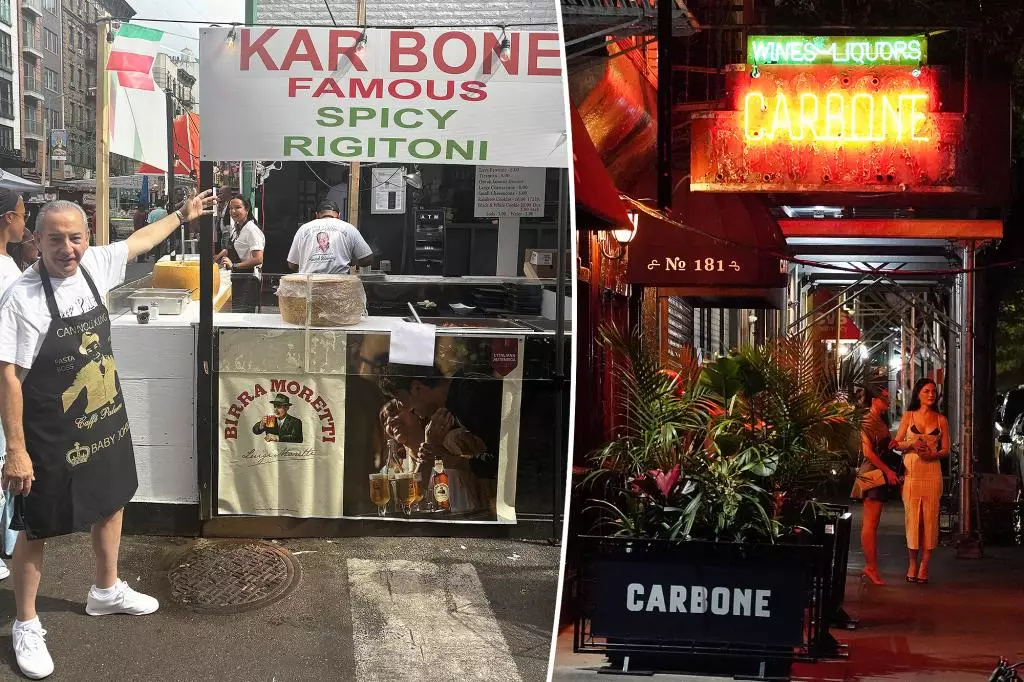The vibrant streets of Little Italy brim with quaint eateries and passionate food vendors, each vying for attention in a competitive culinary landscape. Recently, the famed Carbone restaurant in Greenwich Village, renowned for its celebrity clientele and standout dish—the spicy rigatoni—found itself at the center of an intriguing controversy involving a local competitor, John “Baby John” DeLutro. Operating a pasta stall at the Feast of San Gennaro, DeLutro has attempted to capitalize on Carbone’s illustrious reputation by promoting his own version of the popular dish, cheekily dubbed “KAR BONE FAMOUS SPICY RIGITONI.”
Though this audacious move raises questions about creative branding and fair competition, it also shines a light on the delicate line between homage and infringement in the restaurant industry. DeLutro’s stall, a staple at the annual two-week street festival, aims to attract both locals and tourists alike, leveraging its proximity to the high-profile Carbone as a potential marketing boon.
DeLutro’s decision to play off a well-known brand comes with its risks and rewards. From a legal standpoint, he seems to believe he is on solid ground, referencing an incident where a rival restaurant used his name but altered the spelling with a ‘K.’ The Cannoli King argues that, in doing so, he is merely following suit by tweaking Carbone’s name to fit his own culinary identity. However, this situation highlights the broader implications of brand imitation. In an industry where reputations are built on unique offerings, how far can one go in borrowing the allure of another’s success?
While DeLutro’s intentions may appear lighthearted, there could be ramifications down the line. The go-to response of “it’s all in good fun” may not resonate well with larger establishments like Carbone, which may perceive this as a threat to their hard-earned brand equity. Yet, the Cannoli King’s casual approach to potential legal issues underscores the playful spirit that often permeates informal food cultures, where differentiation is paramount but where inspiration and imitation can coexist unconventionally.
DeLutro’s challenge to Carbone extends beyond mere marketing tactics; it embodies the essence of culinary rivalry. When he boasts about the superiority of his spicy rigatoni, it not only aims to engage customers but also positions him as a worthy contender in the local dining scene. His claim, undoubtedly made in jest, serves as a rallying cry for local purveyors of Italian fare who strive to carve out their niche amid contemporary gastronomic giants.
With the Feast of San Gennaro lasting 11 days and drawing a large crowd, it’s a prime opportunity for DeLutro to enhance his profile among festival-goers, many of whom might appreciate the nostalgia of traditional street food. His playful marketing tactic may resonate with those looking to experience authentic culinary expressions rather than high-priced gourmet meals.
Ultimately, John DeLutro’s initiative to reference Carbone in his pasta stall encapsulates the complexities inherent in culinary branding and competition. While he blends playful banter with legitimate business strategies, it raises important questions about ownership and identity in a thriving community characterized by rich culinary traditions. As the Feast of San Gennaro continues, it remains to be seen whether this friendly rivalry will foster a spirit of creativity and camaraderie or lead to discord among local restaurateurs. Regardless, such instances reveal how deeply intertwined food culture and identity are in neighborhoods steeped in history, tradition, and a dash of competition.

